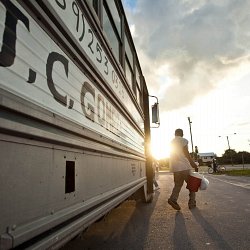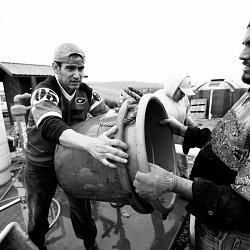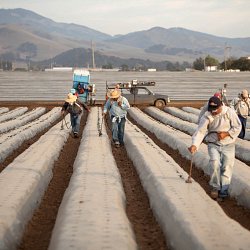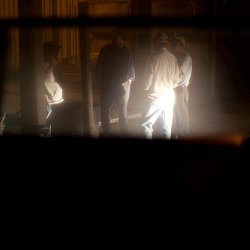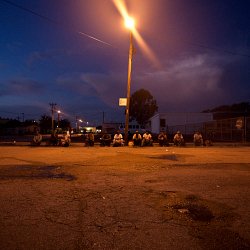Coming to America: Land of Opportunity and Obstacles
National Council of la Raza
Are they in search of a better life for themselves and their families? Do they want to be able to provide for family members at home? Are they escaping persecution or following a dream toward the “land of opportunity?” Our nation’s history tells us that the list of reasons why a person migrates to the United States is as varied and diverse as the populations of immigrants themselves.
Who Is Dayani Cristal beautifully tells the story of one man’s journey to the States from Honduras. The social context in his home country that leads him to leave is slowly revealed throughout the film. There are many factors that may push immigrants to leave their home countries, and as we see with Dilcy, many of them risk their lives in the process. At the same time, one of the strongest factors pulling immigrants into our great nation is actually us -- that is, our economy, and more specifically, our labor demand.
We have heard stories nationwide about how immigrants are contributing to their local economies, including how American businesses depend on their labor, and how immigrants themselves bring strong entrepreneurial skills. Many of the jobs that we need filled—farmworkers, construction workers, dishwashers, maids, etc—are back-breaking and low-paying jobs that most Americans have no interest in doing. We at the National Council of La Raza (NCLR), the largest national Hispanic civil rights and advocacy organization in the US, spoke with a few our community-based Affiliate organizations. Their responses tell a clear story about the need for labor in places across the country like Charlotte, North Carolina, Chicago, Illinois and Stockton, California.
The simple truth is that when our economy grows, our need for labor increases, and we often see an upturn in immigration to meet that need. In the last few years with the economic downfall, we have seen immigration decrease for that very reason. According to the Pew Hispanic Center, the number of undocumented immigrants entering the U.S. was nearly two thirds smaller between 2007-2009 than it was from 2000-2005. But this does not mean that our need for all types of workers will not grow again. Unfortunately, our immigration system is ill-equipped to meet the ebbs and flows of our economy’s labor needs. Each year, only 5,000 green cards are available for unskilled workers, which is nowhere near the mark to meet our country’s needs. As you hear in the video above, food is rotting in the fields in California and construction companies in North Carolina can’t find sufficient workers to fulfill their contracts. That is one reason why we need comprehensive immigration reform that provides a way for immigrant workers to enter the U.S. through safe and legal channels in order to meet legitimate workforce needs across sectors of our economy.
NCLR does a great deal of legislative and policy analysis on the economy and immigration and the intersection of those two issues. A few key areas of intersection like employment verification and worker protections must be addressed in any immigration reform solution. A program that will require employers to check the eligibility of their workforce is reasonable but it should be phased in over the course of several years and include recourse for workers who are harmed by errors made by employers or government agencies. Any employment verification program should not harm people who are lawfully authorized to work. Independent audits of employers and agencies and strong penalties for any abuse of the system are also important in order to monitor adverse impacts on eligible workers and improve compliance.
It is also necessary to harmonize the enforcement of labor laws and protections with immigration laws in the workplace. Because employers who exploit the vulnerable status of undocumented workers are a principal driver of unauthorized migration, immigrants should have the same rights and responsibilities as other U.S. workers, including whistleblower protections, back-pay and a private right of action in cases of labor law violations. No worker, immigrant or otherwise, should have to endure discrimination or exploitative situations in their workplaces. At NCLR, we have collected stories of immigrants as well as non-immigrant Latinos who have suffered greatly as a result of the unfair labor practices. To fully protect the workforce, any immigration reform solution must include measures to stop unscrupulous employers from undercutting U.S. workers and exploiting immigrant workers and provide workers with the ability to protect themselves by changing jobs and availing themselves of full labor protections. Additionally, the reach and effectiveness of job programs for U.S. workers should be improved to strengthen the needs of the U.S. workforce.
Our country needs a process which responds to our labor needs in a regulated, orderly fashion while providing for full labor rights and protections, a break from our current system. This type of process is better equipped to end the cycle created by previous immigration reforms which have tightened enforcement but failed to establish effective legal avenues that respond to the needs of our economy and protect the American workforce. In short, NCLR believes that such a program, properly constructed, with the opportunity for workers to eventually pursue legal permanent residency and then citizenship, is the best way to prevent the nation from having another debate in the future about legalizing yet another group of workers who live and work unlawfully in the U.S. It is clear that we have a broken immigration system NOT because there was a legalization program in the 1980s, but because our legal immigration system is not keeping pace with our economy and our family values.

